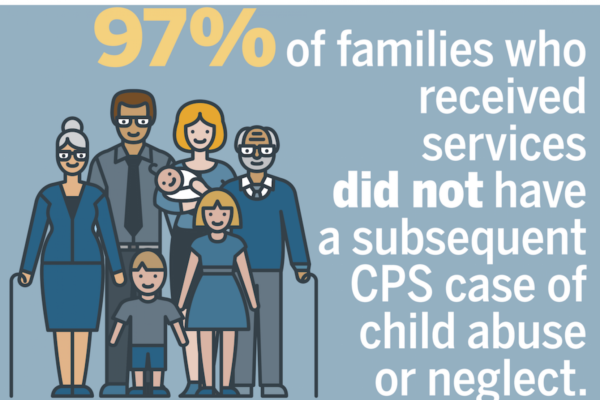AUSTIN, Texas — Texas families who receive child maltreatment prevention services do not have a subsequent child protective services case, according to a new report from the Texas Institute for Child & Family Wellbeing at The University of Texas at Austin. It is the first report to show that receiving services from Texas child maltreatment prevention programs prevents child abuse cases, and that these programs are effective in the long run.
Researchers analyzed data from two statewide child maltreatment prevention programs — Prevention and Early Intervention (PEI) and Services to At-Risk Youth (STAR) — that provide services such as family counseling, parenting classes and home visitation. Findings show that only 3 percent of the families who received these services had a subsequent substantiated case of child maltreatment.
“Traditionally, the Department of Child and Family Services only tracked families that were receiving prevention services because they had an open child maltreatment case,” said Monica Faulkner, social work professor and director of the Texas Institute for Child & Family Wellbeing. “Thus, the broader and long-term effectiveness of prevention services was largely unknown. We were able to combine seven years’ worth of data for two statewide programs. Our analysis shows that prevention works.”
Researchers gathered data from a total of 137,068 caregivers who received services from 2008 to 2015 across 253 of the 254 Texas counties. Of these caregivers, 97 percent did not have a subsequent substantiated case of child maltreatment. Of the 3 percent of caregivers who did, the majority (75 percent) had one case that happened a year or more after the reception of services. Neglectful supervision was the most commonly reported type of maltreatment.
“Preventing maltreatment is the best investment for Texas. Paying for child maltreatment investigations and foster care placements is expensive for taxpayers,” Faulkner said. “And child maltreatment has a human cost for children, families and communities that seeps into virtually every part of society.”
PEI, a division of the Texas Department of Family and Protective Services, manages and creates community-based child maltreatment prevention programs. STAR is a PEI program that serves families in crisis through local agencies that provide counseling, respite care and parenting-skills classes. Each agency also uses media campaigns and educational material to prevent abuse and neglect.




